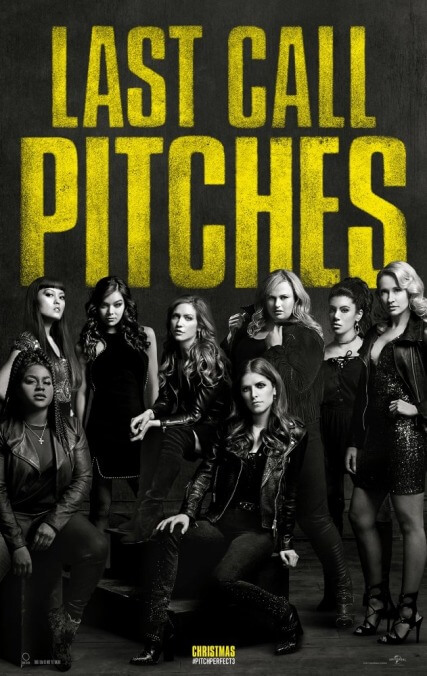Pitch Perfect 3 is still likable, but it's singing on fumes

With so many platforms available for film distribution, it’s a missed opportunity that Pitch Perfect 3 didn’t release directly to FX, preferably unannounced on a lazy Sunday afternoon. The box office success of its a predecessors in the rarified field of a cappella comedy ensured that could never happen, of course. But while Pitch Perfect and Pitch Perfect 2 parlayed a fun, disposable night out at the movies to cable rewatchability, Pitch Perfect 3 would probably fare best if viewers bypassed the night out all together, and experienced it more as a series of additional, less crucial scenelets featuring the extremely likable cast, possibly augmented by a nap or some laundry-folding.
If Pitch Perfect 2 was a sloppy, likable victory lap that at least interrogated some of the first movie’s assumptions, the third movie is more of a too-soon reunion, telegraphed by the fact that the graduated members of the Barden Bellas are reunited about seven minutes into the film (and three of them appear to already share a small New York apartment). Beca (Anna Kendrick) has just quit a music producer gig over a difficult client, Fat Amy (Rebel Wilson) is doing a one-woman street show as “Fat Amy Winehouse,” and Chloe (Brittany Snow) is applying to vet school. When now-senior Emily (Hailee Steinfeld) invites the group to an alumni event, everyone decides they can ditch their sometimes disappointing adult lives for a slot on a USO tour of the prettiest cities of Western Europe (one can only hope troops in less cushy locations are simply getting a better group of performers).
Naturally, there are other bands on the bill with them. “Is there a competition? There should always be a competition,” says Chloe, the oldest and neediest Bella, amusingly lampshading the plot machinations of these movies with her fanaticism. Yes, there’s a competition: On the basis of their performances, one of the acts will be selected to open for headliner DJ Khaled on the televised portion of the final show. That’s all the Bellas need to once again pretend to be the scrappy underdogs, because if there’s one thing the troops will absolutely despise on sight, it’s pretty young women covering songs they already know. The movie doesn’t even seem convinced; the Bellas’ first performance gets interrupted toward its end, and then there’s a cut to the girls aghast at what a disaster it was.
Rather than push more jokes about its narrative formulas, Pitch Perfect 3 proceeds with a halfhearted, ginned-up rivalry between the Bellas and an intimidating, snobby rock band, the filmmakers’ ideas of which are downright bizarre: girl-group rhyming names (Chastity, Calamity, etc.) and circa-2004 punk-pop. (“They can really shred,” one character says as the band pounds out a three-chord melody.) Khaled, meanwhile, is either a terrible actor or trying to act terribly. Either way, the movie tries to work his awkwardness into something like shtick, but it doesn’t really commit to reconceiving him as a bizarre self-parody. So instead, he’s just a guy who gets a lot of reaction shots despite not being good at reaction shots.
With a thinnier, sillier story than ever before, the threequel is left with its twin pillars of appeal: musical performances by the core cast, and shtick, also by the core cast. Though the former does include a spotlight on the best-ever Britney Spears song (“Toxic”), toggling between an a cappella performance and an instrumental riff, most of the performances are a letdown considering that director Trish Sie has worked on a litany of inventive OK Go music videos as well as the fifth Step Up movie (far from the best one, but still: some great choreography). Here, most of the songs are afterthoughts with little visual panache outside of the winking USO costumes.
As it happens, almost every element of Pitch Perfect 3 feels like it’s been neglected for some other, more important story that never materializes. Comedy-wise, there are some funny running gags: Fat Amy’s unfounded disdain for Emily; the continuing presence of the eternally superfluous Jessica (Kelley Jakle) and Ashley (Shelley Regner); and a general irreverence for series hallmarks like competitive riff-offs, female bonding, and music-nerd romance. But as fun as it is to see Kendrick swat away a Solo cup in reference to the surprise radio hit from the first film and swat away her laugh lines like they’re an imposition (she can make even nonchalance pretty appealing), Pitch Perfect 3 seems more concerned with shrugging off its legacy than engaging with it.
There’s a better movie to be made about how a close-knit a cappella group goes about surviving as adults. Unfortunately, the screenplay, credited to Kay Cannon (a 30 Rock writer who pepped up the first two movies) and Mike White, is so indifferent to the Bellas’ post-college careers that they’re dealt with mostly in a trailer-ready quick-cut misery montage. Actually, it might not be the screenplay that traffics in this indifference but rather the final cut; the black-and-white B-roll that runs over the credits makes it look like a lot was excised to make this the shortest of the series by a solid 20 minutes.
What remains feels more than a little like B-roll itself: scattered bits of improv, more funny bits for Hana Mae Lee as the world’s quietest singer, and an excruciatingly dumb action semi-spoof involving John Lithgow as Rebel Wilson’s father. It’s half-assed in every way but cast retention; almost all the major female characters return. Pitch Perfect has always been a refreshingly woman-heavy franchise, and this one further jettisons the recognizable dudes from the first two movies, which isn’t a bad move until, for some reason, they’re replaced with bland potential boyfriends, bad-dad figures, and DJ Khaled. The movie’s listlessness turns out to be the most authentic thing about it; these women must have shown up primarily for each other, because they’re sure not here to make a good sequel.